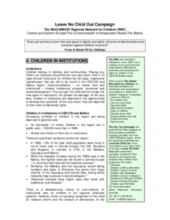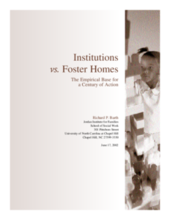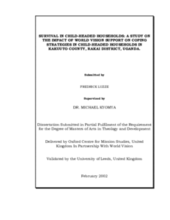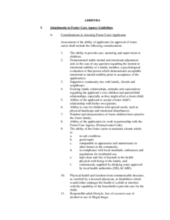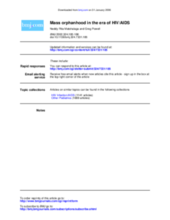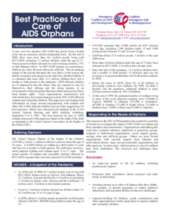Displaying 14241 - 14250 of 14551
This paper provides a guideline for the implementation of reunification and reintegration programs for agencies providing institutional care for orphans. It outlines the different strategies and activities an organization in Ethiopia used to transition from institutional care to community-based childcare projects.
This paper examines the negative impact of institutional care in central eastern Europe, the Commonwealth of Independent States and the Baltics region. It promotes community-based care alternatives and provides statistics. It also includes a list of useful resources addressing orphaned and vulnerable children.
A review of institutional care and family-centered care with a discussion of both positive and negative aspects of group care. This review paper is primarily focused on showing the inefficacy of group care and recommending other forms of care such as kinship care and even foster care as options that are more cost effective and better for children’s development.
This paper presents a study in Uganda on the effects of NGO interventions, and focuses on coping strategies in child-headed households (CHHs) and on community support systems.
Brief guidelines on assessing and training foster carers, and supporting children in foster care placements.
A report of an action research study done by Farm Orphan Support Trust of Zimbabwe (FOST), to learn about the problems of child-headed households on commercial farms in Mashonaland Central and Manicaland provinces. The report includes the problems indentified and some recommendations for interventions, such as integration of psycho-social support and provision of material needs.
Documents the nature of sexual abuse against girls in Zambia, why it continues to happen, and the links with HIV infection. Outlines policies for prevention and details what each relevant organization on the ground is doing (or not doing) to address the problem.
A brief editorial which argues that only by addressing the fundamental causes of the HIV/AIDS epidemic, such as poverty and social exclusion, will a sustainable solution be achieved. Support for extended families and education for children affected by HIV/AIDS are needed to respond the crisis, as well as a larger scale effort to transfer resources, strengthen economies and secure investments throughout Africa.
Brief overview of successes, challenges, threats and programmatic best practices in addressing the needs of children affected by AIDS.
Guidelines and criteria for establishing and monitoring alternative care arrangements including emergency transit booth care (ETBC), foster care, and independent living for separated Liberian refugee children in Sierra Leone.


